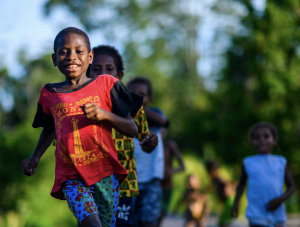
Mahkota – which is funded by DFAT – has launched a new paper discussing the lessons learnt from implementing cash transfers in the remote province Papua, Indonesia.
In 2017, the Indonesian province of Papua launched an inclusive child grant for all indigenous Papuan children under the age of four. The programme, called Bangun Generasi dan Keluarga Papua Sejahtera (BANGGA Papua), is currently being implemented in three districts with plans to eventually scale-up to the entire province. The programme was developed by the Provincial Government of Papua (PGP) with technical assistance from development partners and is funded with the province’s special autonomy funds.
The paper states that Indonesia has an unusually young population compared to its neighbours, with one third of its population under the age of 14. The province of Papua also has the highest rates of poverty and lowest child development in Indonesia. In response, the paper explains, the Provincial Government of Papua launched the programme, BANGGA Papua with the overall goal of furthering the government’s commitment to achieving a “Generasi Emas,” or a golden generation of Papuans.
A notable element of the paper is how the design and implementation of the programme took into consideration the geographic constraints, limited infrastructure and political complexities of the area. One issue that implementers faced was that many recipients lacked formal identification. However, the paper notes that “BANGGA Papua has set the precedent that legal identification (or lack thereof) should not be an obstacle for eligible beneficiaries to register for social protection programs. An inclusive social protection scheme that motivates eligible beneficiaries to register can stimulate the demand for national identification.” The innovative measures that the programme has taken are therefore instructive for a wide range of countries that are implementing social protection programmes in similarly remote contexts.
The inclusive child grant being offered by the BANNGGA Papua programme represents an aspirational move to improve opportunities for young people in Indonesia, as well as providing an inspiring example of what is possible within social protection programmes.
Read more like this:
Policy Brief: Assessing the potential for multi-tiered child benefits in Viet Nam – A policy brief
Podcast: “Investing in Child benefits in a COVID-19 World”



